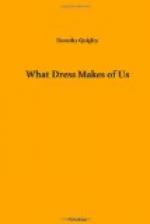[Illustration: No. 89]
If he wears black and white check trousers and a short blue coat, he should travel with a screen. A man in just such a rig attracted no end of comment in a fashionable hotel. The caricaturing effect of his trousers and coat were unspeakably comical. The wearer had a face as grave as an undertaker’s and the air of a serious-minded college professor; but he had the nondescript look of a scarecrow composed of whatever available garments could be obtained from the cast-off wardrobe of summer boarders in a farmhouse.
[Illustration: No. 90]
Coats assuredly have the power of making cartoons—living, jocular cartoons—of their wearers. It would hardly seem necessary to call attention to the fact that a man of huge dimensions should not wear a short coat, such as shown in sketch No. 91, yet his type is too frequently seen attired in this style. A man so dressed certainly seems the living exemplification of the definition of a jug, namely, “a vessel usually with a swelling belly, narrow mouth, and a handle, for holding liquors.” It cannot be reiterated too often that a large, stout man should aim to acquire the distinction and dignity given by long lines. If his body is proportioned so he really has neither length of torso nor of limb he must pay more attention to the cut of his clothes and attain length in whatever artistic way he can. The long coat, as may be seen in sketch No. 92, not only apparently adds length but it conceals too protuberant curves.
[Illustration: Nos. 91 and 92]
Of course, character counts far more than clothes, we will all agree to that, but at first glance it is a man’s clothes that impress people. Clothes affect our behavior somewhat. For instance, “When the young European emigrant, after a summer’s labor puts on for the first time a new coat, he puts on much more. His good and becoming clothes put him on thinking that he must behave like people who are so dressed; and silently and steadily his behavior mends.” Of course, there is an uplifting truth in George Herbert’s maxim, “This coat with my discretion will be brave,” yet, I am inclined to think that the majority of men who will stop to consider will agree with Emerson, who says, “If a man has not firm nerves and has keen sensibility, it is perhaps a wise economy to go to a good shop and dress himself irreproachably. He can then dismiss all care from his mind, and may easily find that performance an addition of confidence, a fortification that turns the scale in social encounters, and allows him to go gayly into conversations where else he had been dry and embarrassed. I am not ignorant,—I have heard with admiring submission the experience of the lady who declared ’that the sense of being perfectly well dressed gives a feeling of inward tranquillity which religion is powerless to bestow.’”
A popular clothier in New York, understanding this trait of his fellow-men, voices this same sentiment in his advertisement in this succinct way: “Seriously now. Have you ever stopped to think that if you wear good clothing it adds much to that independent, easy feeling you should have when you come in contact with other men?”




